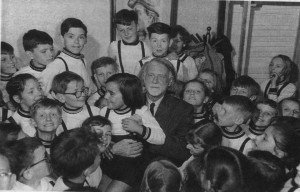Zoltán Kodály was a composer, pioneering ethno-musicologist, ground-breaking educator and music critic. Along with Béla Bartók, he is among the two major figures in 20th century Hungarian music. He enjoyed a status in his native land that is perhaps unrivalled by any other figure anywhere else in the world.
He was also important as an educator not only of composers but also of teachers, and, through his students he contributed heavily to the spread of music education in Hungary. He toured his country in his first quest for folk-song sources. With Béla Bartók, whom he met in 1906, he published editions of folk songs (1906–21). Their folk-song collection formed the basis of Corpus Musicae Popularis Hungariae (established in 1951).

“Teach music and singing at school in such a way that it is not a torture but a joy for the pupil; instill a thirst for finer music in him, a thirst which will last for a lifetime.” (Zoltán Kodály)
Kodály was born in Kecskemét, Hungary, on December 16, 1882. Although born into a musical family, his early interests were towards literary studies. He spent his childhood years in Galánta, then the family moved to Nagyszombat (now Trnava, Slovakia) where he studied violin, the piano and sang in the cathedral choir. He explored the scores in the cathedral music library, and taught himself the cello to make up the numbers for his father’s domestic quartet-evenings.
After gaining a PhD in philosophy and linguistics, Kodály went to Paris where he studied with Charles Widor. On his return to Budapest in 1907 he was appointed a professor at the prestigious Liszt Academy where he taught music theory and composition. Kodály was to teach there for most of his life and upon his retirement as a professor, he returned as the Director of the Academy in 1945.
His works, many of which are widely performed, include Psalmus Hungaricus (1923), written to celebrate the 50th anniversary of the union of Buda and Pest; Háry János (1926), a comic opera; two sets of Hungarian dances for orchestra, Dances of Marosszék (1930) and Dances of Galánta (1933) and Te Deum of Buda Castle (1936).
https://youtu.be/4E5YWLdKPO0
“It is my firm conviction that mankind will live the happier when it has learned to live with music more worthily. Whoever works to promote this end, in one way or another, has not lived in vain.” (Zoltán Kodály)
In 1945 he became the president of the Hungarian Arts Council, and in 1962 received the Order of the Hungarian People’s Republic. His other posts included a Presidency of the International Folk Music Council and Honorary Presidency of the International Society for Music Education. He died in Budapest on 6th March 1967, as one of the most respected and well-known figures in the Hungarian arts.
Read more about Zoltán Kodály at the International Kodály Society’s website!
Photo: www.szentesinfo.hu, www.facebook.com/International-Kodaly-Society
Copy editor: bm